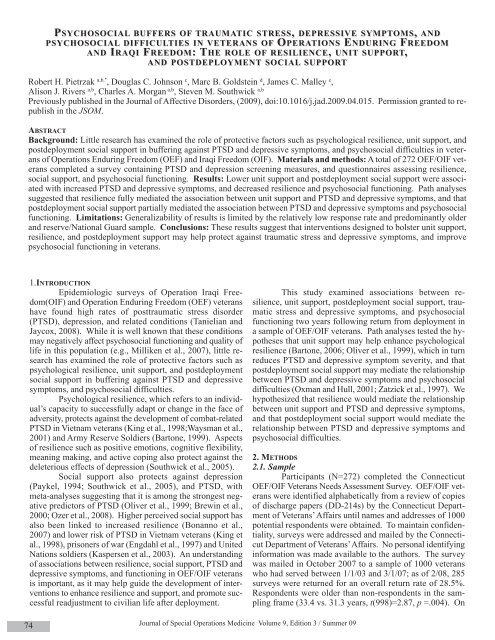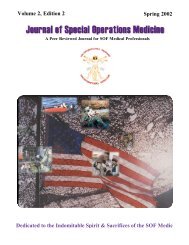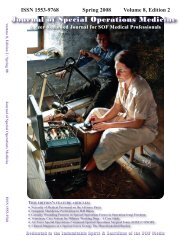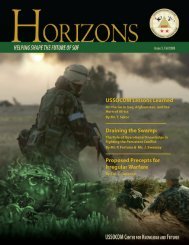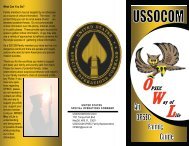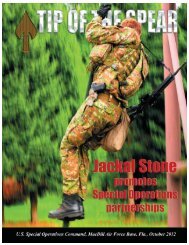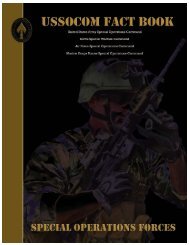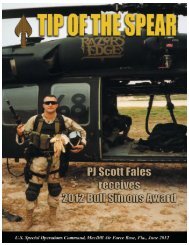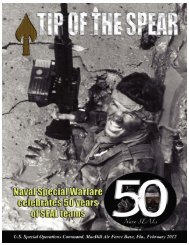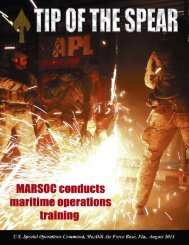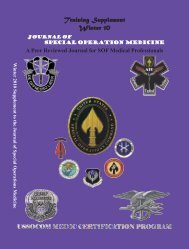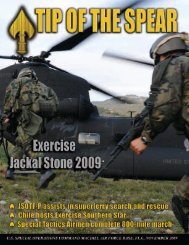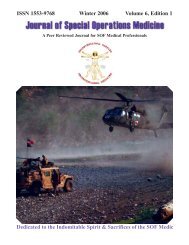PSYCHOSOCIAL BUFFERS OF TRAUMATIC STRESS, DEPRESSIVE SYMPTOMS, ANDPSYCHOSOCIAL DIFFICULTIES IN VETERANS OF OPERATIONS ENDURING FREEDOMAND IRAQI FREEDOM: : T HE ROLE OF RESILIENCE, UNIT SUPPORT,AND POSTDEPLOYMENT SOCIAL SUPPORTRobert H. Pietrzak a,b,* , Douglas C. Johnson c , Marc B. Goldstein d , James C. Malley e ,Alison J. Rivers a,b , Charles A. Morgan a,b , Steven M. Southwick a,bPreviously published in the Journal of Affective Disorders, (2009), doi:10.1016/j.jad.2009.04.015. Permission granted to republishin the JSOM.ABSTRACTBackground: Little research has examined the role of protective factors such as psychological resilience, unit support, andpostdeployment social support in buffering against PTSD and depressive symptoms, and psychosocial difficulties in veteransof <strong>Operations</strong> Enduring Freedom (OEF) and Iraqi Freedom (OIF). Materials and methods: A total of 272 OEF/OIF veteranscompleted a survey containing PTSD and depression screening measures, and questionnaires assessing resilience,social support, and psychosocial functioning. Results: Lower unit support and postdeployment social support were associatedwith increased PTSD and depressive symptoms, and decreased resilience and psychosocial functioning. Path analysessuggested that resilience fully mediated the association between unit support and PTSD and depressive symptoms, and thatpostdeployment social support partially mediated the association between PTSD and depressive symptoms and psychosocialfunctioning. Limitations: Generalizability of results is limited by the relatively low response rate and predominantly olderand reserve/National Guard sample. Conclusions: These results suggest that interventions designed to bolster unit support,resilience, and postdeployment support may help protect against traumatic stress and depressive symptoms, and improvepsychosocial functioning in veterans.1.INTRODUCTIONEpidemiologic surveys of Operation Iraqi Freedom(OIF)and Operation Enduring Freedom (OEF) veteranshave found high rates of posttraumatic stress disorder(PTSD), depression, and related conditions (Tanielian andJaycox, 2008). While it is well known that these conditionsmay negatively affect psychosocial functioning and quality oflife in this population (e.g., Milliken et al., 2007), little researchhas examined the role of protective factors such aspsychological resilience, unit support, and postdeploymentsocial support in buffering against PTSD and depressivesymptoms, and psychosocial difficulties.Psychological resilience, which refers to an individual’scapacity to successfully adapt or change in the face ofadversity, protects against the development of combat-relatedPTSD in Vietnam veterans (King et al., 1998;Waysman et al.,2001) and Army Reserve Soldiers (Bartone, 1999). Aspectsof resilience such as positive emotions, cognitive flexibility,meaning making, and active coping also protect against thedeleterious effects of depression (Southwick et al., 2005).Social support also protects against depression(Paykel, 1994; Southwick et al., 2005), and PTSD, withmeta-analyses suggesting that it is among the strongest negativepredictors of PTSD (Oliver et al., 1999; Brewin et al.,2000; Ozer et al., 2008). Higher perceived social support hasalso been linked to increased resilience (Bonanno et al.,2007) and lower risk of PTSD in Vietnam veterans (King etal., 1998), prisoners of war (Engdahl et al., 1997) and <strong>United</strong>Nations soldiers (Kaspersen et al., 2003). An understandingof associations between resilience, social support, PTSD anddepressive symptoms, and functioning in OEF/OIF veteransis important, as it may help guide the development of interventionsto enhance resilience and support, and promote successfulreadjustment to civilian life after deployment.This study examined associations between resilience,unit support, postdeployment social support, traumaticstress and depressive symptoms, and psychosocialfunctioning two years following return from deployment ina sample of OEF/OIF veterans. Path analyses tested the hypothesesthat unit support may help enhance psychologicalresilience (Bartone, 2006; Oliver et al., 1999), which in turnreduces PTSD and depressive symptom severity, and thatpostdeployment social support may mediate the relationshipbetween PTSD and depressive symptoms and psychosocialdifficulties (Oxman and Hull, 2001; Zatzick et al., 1997). Wehypothesized that resilience would mediate the relationshipbetween unit support and PTSD and depressive symptoms,and that postdeployment social support would mediate therelationship between PTSD and depressive symptoms andpsychosocial difficulties.2. METHODS2.1. SampleParticipants (N=272) completed the ConnecticutOEF/OIF Veterans Needs Assessment Survey. OEF/OIF veteranswere identified alphabetically from a review of copiesof discharge papers (DD-214s) by the Connecticut Departmentof Veterans’Affairs until names and addresses of 1000potential respondents were obtained. To maintain confidentiality,surveys were addressed and mailed by the ConnecticutDepartment of Veterans’Affairs. No personal identifyinginformation was made available to the authors. The surveywas mailed in October 2007 to a sample of 1000 veteranswho had served between 1/1/03 and 3/1/07; as of 2/08, 285surveys were returned for an overall return rate of 28.5%.Respondents were older than non-respondents in the samplingframe (33.4 vs. 31.3 years, t(998)=2.87, p =.004). On74Journal of <strong>Special</strong> <strong>Operations</strong> Medicine Volume 9, Edition 3 / <strong>Summer</strong> 09
average, time between return from deployment to OEF/OIFand survey completion was 26.9±.7 months.2.2. Assessment instrumentsThe Unit Support Scale (USS) is a self-report measurefrom the Deployment Risk and Resilience Inventory(DRRI; King et al., 2006) that assesses the quality of relationshipsand degree of cohesion between a Soldier andhis/her unit. Cronbach’s α=.93.The Postdeployment Social Support Scale is a selfreportmeasure from the DRRI that assesses the extent towhich family, friends, coworkers, employers, and communityprovide postdeployment emotional support and instrumentalassistance. Cronbach’s α=.82.The Connor–Davidson Resilience Scale (Connor andDavidson, 2003) is a self-report measure of psychological resilience.Higher scores reflect greater resilience. Cronbach’sα=.94.The Combat Experiences Scale (CES) is a self-reportinstrument from the DRRI that assesses exposure tocombat (e.g., firing a weapon, witnessing injury and death).Higher scores reflect more combat exposure. Cronbach’sα=.93.The Posttraumatic Stress Disorder Checklist-MilitaryVersion (PCL-M; Weathers et al., 1991) is a 17-item instrumentbased on DSM-IV criteria for PTSD. Higher scoresindicate greater posttraumatic stress symptoms. Cronbach’sα=.96.The Patient Health Questionnaire-9 (Kroenke andSpitzer, 2002) is a 9-item self-report screening instrument fordepression derived from the clinician-administered PrimaryCare Evaluation of Mental Disorders. Higher scores indicategreater depressive symptoms. Cronbach’s α=.92.The Psychosocial Difficulties Scale (PDS) is a 23-item questionnaire developed by two of the authors (M.B.G.,J.C.M.) that assesses psychosocial functioning in family andpeer relationships (e.g., “have difficulty connecting emotionallywith family and/or friends”), and work, school, andfinancial functioning (e.g., “have difficulty finding employment”;“have difficulty paying bills”). Ratings are “Not aconcern”, “A slight concern”, “A moderate concern”, and “Amajor concern”. Higher scores indicate greater psychosocialdifficulties. Cronbach’s α=.89.2.3. Data analysisNon-normally distributed data (e.g., PCL-M scores)were transformed using logarithmic base 10 transformations.Pearson correlations were computed between measures of socialsupport and resilience, PTSD and depressive symptoms,and psychosocial difficulties. Path analyses were conductedto test the hypotheses that resilience mediates the relationshipbetween unit support and PTSD and depressive symptoms;and that postdeployment social support mediates therelationship between PTSD and depressive symptoms andpsychosocial difficulties. Data from all respondents were includedin these analyses, including those with and withoutpositive screens for PTSD and depression. Model fit wasevaluated using a number of fit statistics, including χ2, rootmean square error of approximation (RMSEA), comparativefit index (CFI), and Tucker–Lewis Index (TLI). By convention,lower, non-significant χ2 values, RMSEA values ≤.08,and CFI and TLI values ≥.90 indicate acceptable model fit(Kline, 2005). Path coefficients are presented as standardizedregression weights (β).3. RESULTSThe mean age of the total sample was 34.9±.4 years,89% were white, 82% completed at least some college education,the majority (72%) were in the National Guard or reservesand 28% were on active duty; 87% were in the Army,9% Marines, 2% Air Force, and 2% multiple branches.Table 1 shows mean scores and standard errors, andcorrelations between all measures. Unit support scores correlatedwith scores on all other variables except combat exposureand psychosocial difficulties. Postdeployment socialsupport scores correlated positively with resilience scores andnegatively with scores on all other variables. Resiliencescores correlated negatively with measures of PTSD and depressivesymptoms, and psychosocial difficulties, but theywere not associated with combat exposure. Combat exposurescores correlated negatively with postdeployment socialsupport scores and positively with measures of PTSD and depressivesymptoms, and psychosocial difficulties. PTSD anddepressive symptoms correlated positively with scores on ameasure of psychosocial difficulties.Previously Published 75
- Page 1 and 2:
Volume 9, Edition 3 / Summer 09 Jou
- Page 3 and 4:
An 18D deworms a camel during a “
- Page 5 and 6:
Field Evaluation and Management of
- Page 7 and 8:
The circumferential anchoring strip
- Page 9 and 10:
In doing so, all the skin is closed
- Page 11 and 12:
NATO SOF Transformation and theDeve
- Page 13 and 14:
current and future operations, thes
- Page 15 and 16:
sion of a physician, and limited pr
- Page 17 and 18:
REFERENCES1. James L. Jones, “A b
- Page 19 and 20:
This article is the first of two me
- Page 21 and 22:
Figure 4 : A Special Forces medic c
- Page 23 and 24:
exposure. Conversely, the customary
- Page 25 and 26:
7. Ted Westmoreland. (2006). Attrib
- Page 27 and 28: first three days of injury, althoug
- Page 29 and 30: 9. Markgraf CG, Clifton GL, Moody M
- Page 31 and 32: the only sign of OCS may be elevate
- Page 33 and 34: E. The canthotomy allows for additi
- Page 35 and 36: 33. Rosdeutscher, J.D. and Stradelm
- Page 37 and 38: Tinnitus, a Military Epidemic:Is Hy
- Page 39 and 40: The development of chronic NIHL pro
- Page 41 and 42: supplied by diffusion. During expos
- Page 43 and 44: similar to those of other authors,
- Page 45 and 46: promising effect on tinnitus. Howev
- Page 47 and 48: ADDITIONAL REFERENCESHoffmann, G; B
- Page 49 and 50: et al. demonstrated that both right
- Page 51 and 52: TYPICAL CHEST RADIOGRAPH FINDINGS I
- Page 53 and 54: 11. Norsk P, Bonde-Petersen F, Warb
- Page 55 and 56: ABSTRACTS FROM CURRENT LITERATUREMa
- Page 57 and 58: tourniquet times are less than 6 ho
- Page 59 and 60: tal from July 1999 to June 2002. In
- Page 61 and 62: Operation Sadbhavana: Winning Heart
- Page 63 and 64: CENTRAL RETINAL VEIN OCCLUSION IN A
- Page 65 and 66: of the X chromosome. Notable is tha
- Page 67 and 68: AUTHORS*75th Ranger Regiment6420 Da
- Page 69 and 70: Casualties presenting in overt shoc
- Page 71 and 72: PSYCHOLOGICAL RESILIENCE AND POSTDE
- Page 73 and 74: spondents without PTSD (M = 4.6, SD
- Page 75 and 76: patients, whereas the mean score of
- Page 77: 29. Whealin JM, Ruzek JI, Southwick
- Page 81 and 82: ing functioning in both PTSD (Zatzi
- Page 83 and 84: Editorial Comment on “Psychologic
- Page 85 and 86: Blackburn’s HeadhuntersPhilip Har
- Page 87 and 88: The Battle of Mogadishu:Firsthand A
- Page 89 and 90: Task Force Ranger encountered enemy
- Page 91 and 92: Peter J. Benson, MDCOL, USACommand
- Page 93 and 94: Numerous military and civilian gove
- Page 95 and 96: Anthony M. Griffay, MDCAPT, USNComm
- Page 97 and 98: This is a great read that speaks di
- Page 99 and 100: and twenty-eight. Rabies immune glo
- Page 101 and 102: Rhett Wallace MD FAAFPLTC MC SFS DM
- Page 103 and 104: LTC Craig A. Myatt, Ph.D., HQ USSOC
- Page 105 and 106: LTC Bill Bosworth, DVM, USSOCOM Vet
- Page 107 and 108: Europe, Mideast, Africa and SWAU.S.
- Page 109 and 110: SOF and SOF Medicine Book ListWe ha
- Page 111 and 112: TITLE AUTHOR ISBNCohesion, the Key
- Page 113 and 114: TITLE AUTHOR ISBNI Acted from Princ
- Page 115 and 116: TITLE AUTHOR ISBNRats, Lice, & Hist
- Page 117 and 118: TITLE AUTHOR ISBNThe Healer’s Roa
- Page 119 and 120: TITLE AUTHOR ISBNGuerilla warfare N
- Page 121 and 122: TITLEAUTHORBlack Eagles(Fiction)Bla
- Page 123 and 124: TITLE(Good section on Merrill’s M
- Page 125 and 126: GENERAL REFERENCESALERTS & THREATSB
- Page 127 and 128: Aviation Medicine Resources: http:/
- Page 129 and 130:
LABORATORYClinical Lab Science Reso
- Page 131 and 132:
A 11 year old boy whose tibia conti
- Page 133 and 134:
Meet Your JSOM StaffEXECUTIVE EDITO
- Page 135 and 136:
Special Forces Aidman's PledgeAs a


